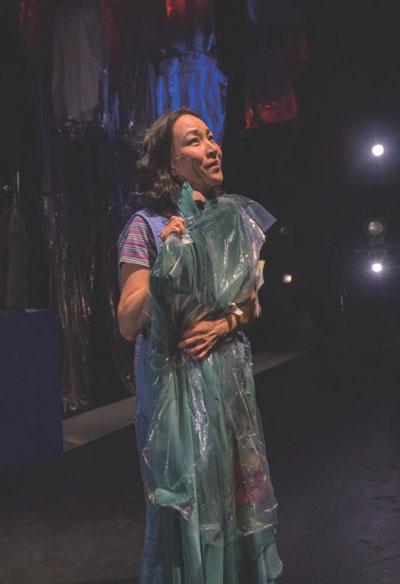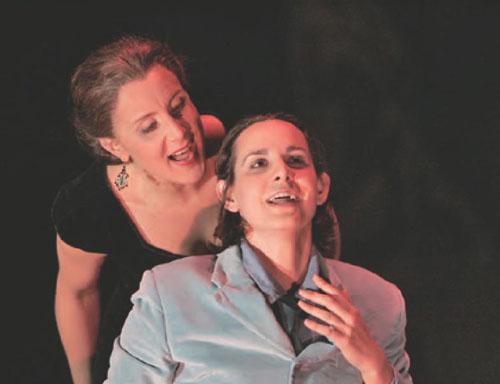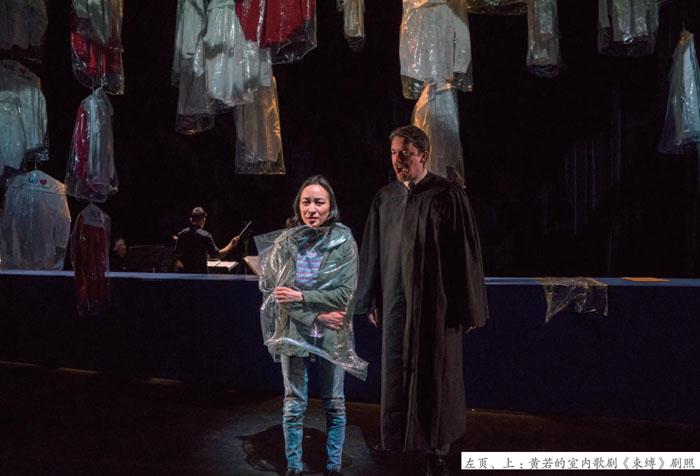长长短短的那些事
2019-08-23司马勤
司马勤



我说过很多次,歌剧往往都太长。其实,我还记得自己曾经这样写道:“自从歌剧这门艺术创立以来,从来没有一套歌剧是需要拖得更长的。”今天,这句话被推翻了。
我不是指乐评人马克斯威德( Mark Swed)在《洛杉矶时报》发表过的评论。他认为瑞奇伊恩·戈登( Rickylan Gordon) 2007年创作的《愤怒的葡萄》(The Grapes of Wrath)的时长“太短”了,尽管这部歌剧演出的时长已长达四个小时。(我也应该维护斯威德一把:他当时也承认,自己的这个立场属于少数。)我其实指的是《纽约时报》文化版的一个标题。几周前,《纽约时报》首席乐评人安东尼·托马西尼( Anthony Tommasini)就黄若的歌剧《束缚》(Bounci)发表了评论文章,用上的标题是“一部太短的新歌剧的罕见问题”。
黄若的这部45分钟时长的室内歌剧,情节围绕居住在休斯敦的一名越南裔高中生的经历展开:她被迫要选择是去学校上课参加考试还是放弃学业去做兼职工作(她需要赚取工资来养活一家人)。因为她迫于生计选择了打工,最终触犯了得克萨斯州的旷课法令。这个女孩——尽管在学校是个优异生——却被关进监牢,无法工作(赚钱)或回校上课。
《束缚》是休斯敦大歌剧院的委约作品,规模与时长都是按照原本委约的条款而创作的:有限的演出时长、只需要寥寥几件乐器与几名演员、主题是聚焦于休斯敦的亚裔族群。休斯敦现在有10万名越南裔居民,包括与黄若合作担任本剧编剧的诗人朱宝龙,他出生于越南、现居休斯敦(《束缚》是他的首部舞台作品)。歌剧的情节根据真人真事改编,而歌剧院更特别取得允许,将其呈现于舞台上。
这部作品在休斯敦演出时,我确信它能够“直击”其目标受众。对于当年该事件的报纸头条新闻报道,很多人还记忆犹新。就算他们记不起具体的细节,最起码休斯敦的越南裔社群都略有所知。移民家庭中儿童所面对的难题——他们更容易融入新的社会与文化,进而与无法适应美国生活的父母角色对换,小小年纪就不得不负担起家庭的重任——这一问题在全球范围内几乎是普遍存在的。因为细节上有差异,每一个国家的故事都有独特的背景。
但是当鲜榨歌剧团( Fresh Squeezed Opera) -是的,这真的是一个歌剧团的名称——把《束缚>带到纽约,境遇就完全不同了。纽约的观众没有看过休斯敦的新闻报道,大部分人也不知道如果在得克萨斯州旷课,会被关进监狱。一个女孩被父母抛弃这个大前提——在大多数亚洲文化中简直不可思议——失去了本来拥有的悲剧深度。
对于黄若谱写的音乐,托马西尼的评价十分直接,但该剧的故事情节却令他困惑。托马西尼推测,作曲家与编剧两人故意删掉了很多实质的细节,目的是为了让这个故事更具普遍性,但是删掉细节后留下的空白却又没有填补,也没有进一步发展。我可以肯定地说,不仅仅是《纽约时报>的乐评人,大部分在纽约观看这部作品的歌剧迷都没有机会深入了解剧中的这些角色。
《束缚》最终或许会跟黄若的另一部歌剧——《一个美国士兵》(An American So!dier,也是取材于真实故事的作品),遇上同样的好运。《一个美国士兵》本来是华盛顿国家歌剧院的室内歌剧委约作品,时长限于60分钟之内。故事叙述一名年仅19岁的美籍华裔士兵,在阿富汗军事基地因为军中欺凌与种族歧视而自杀的悲剧。2014年,这部歌剧在肯尼迪中心首演十分成功,部分原因是首都华盛顿住了很多军人。可是,当离开这一环境,就需要更多去解释故事的细节。四年之后,黄若与编剧黄哲伦把原版歌剧延伸至时长两小时的管弦乐团伴奏版本,在圣路易斯歌剧院演出。因为故事有机会加入复杂的元素,戏剧效果因此增强不少。
编剧黄哲伦对于“扩充”歌剧这方面,可算是过来人。他曾为《艾娜达马》(Ainadamar,又名《泪之泉》)撰写剧本,合作伙伴是阿根廷一以色列作曲家奥斯瓦尔多·格利约夫( Osvaldo Golijov)。故事主题是西班牙诗人与剧作家费德里科加西亚·洛尔迦( Federico Garcia Lorca)的悲惨结局。《艾娜达马》是一部极为诗意(甚至过于煽情)的作品,2003年在坦格伍德夏季音乐节首演时,观众未必抓得到歌剧应有的戏剧感。两年后,经过大量修改的版本在圣达菲歌剧院亮相——时长延展了一倍、戏剧性更加连贯,导演是彼得·塞拉斯( PeterSellars)。增长版的《艾娜达马》于2006年赢得格莱美奖最佳歌剧奖,后来更在马德里皇家歌剧院以及格拉纳达国际音乐舞蹈节(International Musicand Dance Festival of Granada)上搬演。
…
以上所描述的情况大都是出于财政预算与可行性两方面的考虑。与创作音乐剧的商业模式不同,今天的歌剧作曲家很少在没有收定金(最起码,签订了合约)的情况下动笔写任何东西。同样地,歌剧院也渴望先试听一下音乐效果,才决定是否要委约一部足本的大型新作品。黄若(与黄哲伦)将歌剧“延展”的经历,展示了一个折中的方法。
然而,从艺术的角度上,我们看到了一种不同的工作动态也在运行——而这一根源可以追溯至歌剧过去的历史。寻找合适的故事与音乐风格实在很容易,但要让完成的歌剧真正被观众接受才是艰难的历程——通常要经过多次尝试与失败。
今天的歌剧院演出常规剧目,经常会标明搬演的是哪一个版本。把制作版本的历史资料放在节目单首页好像有点哕唆,但确实是有道理的。很多人通过坎坷的教训才吸取经验,终于明白为什么在罗马获得成功的项目,到了伦敦后竟然一败涂地。
有一些歌剧院选择了普契尼《蝴蝶夫人》原本的两幕版本,尽管当作曲家在世之时,观众显然更偏好修改后的三幕版本。巴黎观众当年看的《汤豪舍》,与瓦格納原来在德累斯顿首演的版本也有很大出入,虽然到头来,巴黎版本也不见得更受欢迎。有时候,歌剧院不需要刻意标明他们演的是哪个版本。如果你看的是威尔第的《唐卡洛斯》(DonCarlos)而非《唐卡洛》(Don Carlo ),那么你可以肯定那是最初首演的巴黎五幕版本,而不是后来亮相于米兰的四幕版本。
《束縛》与《一个美国士兵》可算是这个创造“标准版本”传统的继承者。正如我们需要连接两点才可以画出一条线来一样,一部歌剧作品的历史轨迹必须由首演伸展至重演。任何一部舞台作品想要名留青史的话,通常都需要细腻的调整(甚至是大幅度的改革),让后来的观众也有所动容。任何人打算要把本土的成功作品推广到国外,请不要忘记以上这点。
今天,我们面对的各种情况有所不同了:歌剧作曲家成功地将对不同版本的修订,变为获取丰厚利润的商业模式。大概最明目张胆的案例是克里斯托弗潘德列茨基( Penderecki)的《第六交响曲》。这是一部受马勒《大地之歌》启发而创作的作品,同样取材自中国诗歌,也用上同一位德语翻译家的文本。这些年来,潘德列茨基断断续续地创作这部宏伟大作——其间他把自己的第七、第八交响曲都写完了。事实上,他获得了不同委约方的邀请和报酬,逐渐加上其他乐章,以扩大原作。
真的,为什么要耗尽精力在委约限期前把时长一个小时的作品完成?换来一个分期付款计划来作曲,不是更好吗?这么说来,把《大地之歌》一气呵成完成的马勒看起来像个傻瓜。更不用说普契尼,他把《三联剧)(//Trittico) -次性打包交付给了大都会歌剧院,而没把三部独幕戏分开来“卖”给三家出价最高的歌剧院“买家”。
坦率地说,他们都需要聘用一个更聪明的经纪人。
Many times l've said that opera in general is tooIong. Actually,I think the exact words were, "neverin the history of the genre has an opera needed to bemade Ionger." Now it seems l've been corrected.
I don't mean the way /os Angeles Times critic MarkSwed once wrote about Ricky lan Gordon's 2007opera The Grapes of Wrath, which he claimed was“too short" despite being four hours Iong. (ln hisdefense, Swed did admit this was a minority opinion.)No,I mean right in the headlines of The New YorkTimes, when Anthony Tommasini's review of HuangRuo's Bound a few weeks ago came underthe banner。The Rare Problem of a New Opera That's Too Short." Huang's 45-minute chamber opera concerned aVietnamese high-school student in Houston who,forced to choose between taking a school test andfulfilling her job responsibilities (she was financiallysupporting her entire family) chooses work andfalls afoul of Texas truancy Iaws. The girl-an honorstudent-winds up in jail, failing on both counts.
Originalty commissioned by the Houston GrandOpera, Bound is clearly bound to its original brief:an opera of Iimited duration, requiring minimalforces, focusing on one of the city's various Asiancommunities. Houston has 100,000 Vietnameseresidents, including Huang's librettist Bao-Long Chu,a Houston-based Vietnamese-born poet (Bound washis first work for the stage). The opera was basedon a true story, which the opera company securedpermission to use.
In Houston, l'm sure the opera squarely hit itstarget audience. Many people could remember thenewspaper headlines, and even those who forgotthe details surely recognized the story's Vietnamesecommunity. The problems of immigrant child ren-the strange role reversal when they become theresponsible figu res after their parents fail to fit in-are near-universal. Only the difference in detailsmake the stories distinctive.
But by the time Fresh Squeezed Opera-yes, that'sthe actual name of the company-brought the showto New York, the situation was entirely different.Audiences there never saw the media coverage. Mostpeople had no idea you could be sent to jail in Texassimply for not attending school. The very premisethat the girl had been abandoned by her parents-inconceivabte in most Asian cultures-lost much ofits tragic depth.
Tommasini responded quite directly to Huang'smusic, but the story left him befuddled. Huangand Chu had omitted many of the factual details-aiming to make the story more universal, Tommasinispeculated-but they didn't fill the gaps withdevelopments of their own. lt's safe to say that notjust the Times critic but most people at the New Yorkperformances had no chance to Iearn who thesecharacters were.
Bound may eventually enjoy the same tuck asHuang's other opera that year, An American Soldier,another work based on a true story. Originallycommissioned as a 60-minute chamber piece byWashington National Opera, the story recountsa real-life Chinese-American soldier driven bymilitary hazing and racist taunting to kill himself inAfghanistan at the age of 19. The show played well in2014, pa rtly due to Washington D.C.'s Ia rge milita rypopulation. But outside of that environment, thesto ry needed fu rther explanation. Four yea rs Iater,Huang and his librettist David Henry Hwang unveiledan expanded two-hour, fully orchestrated versionat the Opera Theatre of St. Louis, where the story'sadded complexities deepened its dramatic effect.
Hwang, for his part, faced a simitar situation withAinadamar, his opera with the Argentine-Israelicomposer Osvaldo Golijov based on the tragicdeath of the Spanish poet and playwright FedericoGarcia Lorca. Ainadamar was supremely poetic-too evocative, perhaps, to make dramatic sense forTanglewood audiences at its 2003 premiere. Twoyea rs Iate r, a substa ntial revision-nea rly twice asIong and more dramaticalty coherent-appeared atSanta Fe Opera in a production by Peter Sellars. Therecording ofthe Ionger version won the 2006 GrammyAward for Best Opera, and the work eventually madeits way to Spain at Madrid's Teatro Real and theInternational Music and Dance Festival of G ra nada.
Situations like these stem Ia rgely from financialpracticalities. Unlike their colleagues in commercialmusical theatre, opera composers today rarely writeanything without getting money (or at Ieast signinga contract) beforehand. Likewise, opera companiesoften hesitate to commission a new fuII_length workbefore they have some idea of what it will soundIike. Huang's (and Hwang's) operas reveal one way ofsplitting the difference.
Artisticatly, though, we see a different dynamic atwork-one that traces its roots throughout operatichistory. Finding a suitable story and a musicalapproach is the easy part. Making the finished piececonnect with audiences is where the hard work-andusually much trial and error-comes in.
In repertory works, opera companies today oftenma ke it very clear which edition is being performed.Throwing that kind of history right on the first pageof the program may seem needlessly distracting, butit does serve a point. Too many people have Iearnedthe hard way that what works in Rome can failmiserably in London.
Some opera companies have brought backPuccini's original two-act Madama Butterfly, despiteaudiences in Puccini's time expressing a clearpreference for his three-act revision. The Tannhauserthat audiences saw in Paris differed greatly from whatWagner originally wrote for Dresden, though thatdidn't make it any more popular there. Sometimesopera companies don't even need to mention theedition per se. If you're seeing Verdi's Don Carlosinstead of Don Carlo, you can be pretty sure that it'sthe original five-act version from Paris and not thefou r-act revision that Iater appeared in Milan.
Bound and An American Soldier fall into thistradition of creating a "sta nda rd edition." Just asa Iine becomes a Iine only after a second pointis added, the historic trajectory of an opera isn'testablished by its premiere. Before any dramatic workcan make a bid for posterity, it generally needs thefine-tu ning (if not a substa ntial overhau [) that comesfrom reaching beyond its original audience. This issomething everyone should remember wheneverthey try to export domestic success abroad.
Today, though, we see a different dynamic: Operacomposers have been remarkably successful inturning revisions into a Iucrative business model.lt's perhaps not as brazen as, say, Penderecki's SixthSymphony, a song-symphony of Chinese poemsclearly inspired by Mahler's Das Lied von der Erdeto the point of setting text by the same Germantranslator. Penderecki has been composing the workin fits and sta rts over the years-long after finishinghis Seventh and Eighth Symphonies, in fact-as hegets additional commissions to expand it.
Really, why knock yourself out over a singledeadline for an hour of music when you can composeon the installment plan? It makes Mahler, who wroteDas Lied al! in one go, seem like a total chump. Not tomention Puccini, who delivered all th ree one-acts ofii Trittico directly to the Metropolitan Opera insteadof parsing them out to three separate companies,each to the highest bidder.
Frankty, they both should've had a better agent.
